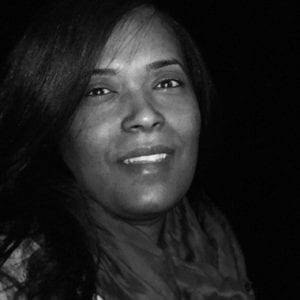For an early to mid-career professional, why should you take the leap into a graduate program? Should you know beforehand exactly what your objectives are? And, how can an experiential project turn into much more than a project?

These are some of the questions I asked Nichole Yates, who graduated from the Corporate and Organizational Communication master’s program in 2019 – and is now embarked on a doctoral program at Northeastern. Nichole is the Talent Acquisition Director, Executive Recruitment at City Year, which partners with 29 communities across the US. City Year is a member of the AmeriCorps national service network and is supported by the Corporation for National and Community Service, school district partnerships, and private philanthropy from corporations, foundations and individuals.
Carl Zangerl (CZ): Nichole, what motivated you to embark on a master’s degree in organizational communication?
Nichole Yates (NY): I certainly had to ramp up my courage to do it! Is not for the faint of heart to be in school and working and parenting. I was happy doing my job and didn’t have specific career objectives in mind. But I thought of it as investment in myself, investing in my own skills development without knowing exactly where it would lead. And so, with lots of family support, I decided to move forward.
CZ: Reflect a bit about your experience once you were in the program.
NY: When I think back on my undergraduate days, I realize that I didn’t understand the power of a network. During my master’s program, I made a conscious effort to reach out to my instructors. Not with the mindset of ‘what they can do for you,’ but rather for how they can inspire you, how you can learn from their broad experience as veteran communication professionals.
I recall an exchange one day in Professor Patty Goodman’s online class. We were discussing grades, and she said “if you’re doing this just to get an ‘A’, then you’re in it for the wrong reasons.” And that clicked for me because certainly I wanted an ‘A’ but I saw myself like loving doing this work, learning everything I could.
CZ : You make such an important point. While some students pursue a master’s degree in communication with specific job goals in mind – and that’s terrific – others, like yourself, are willing to be open to possibilities, open to seeing what evolves as they engage with the curriculum and the academic community they are a part of. And that’s okay too!
NY: Absolutely. The world is changing so rapidly. It’s important to invest in your competencies, your strengths, so that you can seize opportunities that may emerge – roles that may not even exist today or tomorrow. This is also a great reason to intentionally build a professional network as you are progressing through your course of study.
CZ: Let’s talk a little about your capstone project. At the end of our master’s program, students serve as virtual communication consultants to sponsoring organizations. The sponsor provides the communication challenge, and the student does research and develops recommendations to address the challenge. What was your experience like?
NY: My project sponsor was an organization called the Resilient Sisterhood Project (RSP), which seeks to increase the awareness, build knowledge, and inspire action to positively impact the reproductive health of women of African descent. The challenge I was addressing was to help devise a strategic approach to external communication that would not only achieve RSP’s goal of increasing outreach to 18-40-year-old Black women, it would also create revenue streams, build awareness of RSP, and support future expansion and service goals.
As I look back on it, I’m still amazed that I was able to work on a project that was so meaningful to me. It was such a gift, frankly. With the guidance of my professor, Lynn McNamara, I applied not only the skills and knowledge that I had gained in my course of study, but also my professional and life experiences to the project. In the course of doing research, I began to feel so connect to RSP’s mission. The project was critical in expanding my network and helping me focus on some long-term objectives.
CZ: Now you’re pursuing an EdD – your lifelong learning continues!
NY: You know, it’s been vital to me to reach outside of myself, to reach outside of my comfort zone, and to have mentors and sponsors who believe in my work. That’s what has inspired me to continue my education with a focus on workplace equity for black women. In my doctoral studies, I hope to produce research that will help Black women entering their careers, or really at any point in their careers, to be able to say “I have the skills and tools I need to succeed.” My goal is to develop recommendations for organizations that are struggling to retain and nurture talented women of color.
To learn more about City Year, click here.
Our Inspire & Influence website showcases a sampling of some outstanding experiential work, including capstone consulting projects, produced by our students.
Posted by Carl Zangerl, Faculty